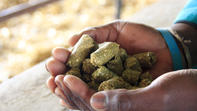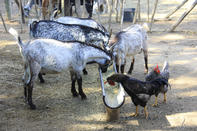A goat gets most of the nutrients from grazing and needs to spend 6 - 8 hours a day grazing (eating grasses) and browsing (eating leaves).

Feeding of your goats should focus on correct veld management so that nourishment required by the animal can be met by natural grazing as far as possible. When the quality of the food decreases during the dry season a farmer needs to supply extra food. Supplement feeding does not replace natural grazing, is just fills the shortage.
Natural grazing is the cheapest feed for goats and production costs will increase with supplementary feeding, but supplementary feeding becomes especially important if goats are in their late pregnancy or early lactation stages.
The feeding needs of a kapater (castrated male goat) or dry ewe are about the same, but in lactation, a goat’s nutritional requirements will increase by more than 50%. (Supplementary feeding of kapaters will only pay off during droughts, or for rounding off for slaughter.)

Supplementary feed should include at least four different types of forage to ensure a balanced diet. In addition, animals need both energy and protein to keep healthy.
For this, legume forages (cowpeas, alfalfa) are high in protein as well as energy. Stored forage (it must be kept dry to prevent it from becoming mouldy) can be fed to supply food in the dry season. Concentrate feeds, use around 400 g per day for an adult non-pregnant goat, can be given as a supplement. A mix of 2 to 3 different types of concentrate will ensure a balance of energy and protein.
A spoon of salt and mineral-and-vitamin mix can be added to ensure requirements for vitamins and minerals are met. Feeds high in energy are maize, barley, brewers' grains and cottonseed oil cake meal. Feeds high in protein include fishmeal, soya bean meal, cottonseed oil cake meal and brewers' grains.
(Brewer’s grains are the leftovers of the fermented grains used in beer making.) To provide a good source of nitrogen and energy for goats, give them a urea-molasses block to lick. This will also help them to digest forage better, especially in the dry season. Keep it in an open container, off the floor, so all goats can lick it when they like.
Clean water should always be available or given at least four times per day and water troughs should be cleaned regularly (daily) and be free of algae and feed. Please note: Information is for educational and informational purposes only and may not be construed as feeding or nutritional advice. For more information on feeding your goats contact your animal health technician, veterinarian or animal feed supplier.
By Marinda Louw